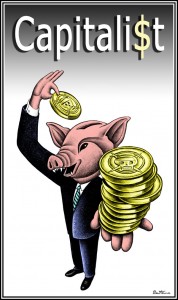Visit msnbc.com for Breaking News, World News, and News about the Economy
Glenn Greenwald reports,
Sen. Dick Durbin, on a local Chicago radio station this week, blurted out an obvious truth about Congress that, despite being blindingly obvious, is rarely spoken: “And the banks — hard to believe in a time when we’re facing a banking crisis that many of the banks created — are still the most powerful lobby on Capitol Hill. And they frankly own the place.” The blunt acknowledgment that the same banks that caused the financial crisis “own” the U.S. Congress — according to one of that institution’s most powerful members — demonstrates just how extreme this institutional corruption is.
Greenwald’s piece for Salon (and republished at Global Research), clearly illustrates how the US government functions as an executive committee of the rich when it comes to handling the economic crisis.
Greenwald points to the revolving door from Congress to K Street lobbyists; how Goldman Sachs has a lock on US Treasury jobs and is funding Congressional banking committee members like Evan Byah; and just happens to post a $1.8 billion profit, just coincidentally of course.
And why isn’t there more outrage? Greenwald thinks its because of what Matt Taibbi calls the “peasant mentality” of Americans:
After all, the reason the winger crowd can’t find a way to be coherently angry right now is because this country has no healthy avenues for genuine populist outrage. It never has. The setup always goes the other way: when the excesses of business interests and their political proteges in Washington leave the regular guy broke and screwed, the response is always for the lower and middle classes to split down the middle and find reasons to get pissed off not at their greedy bosses but at each other. That’s why even people like [Glenn] Beck’s audience, who I’d wager are mostly lower-income people, can’t imagine themselves protesting against the Wall Street barons who in actuality are the ones who fucked them over. . . .
Actual rich people can’t ever be the target. It’s a classic peasant mentality: going into fits of groveling and bowing whenever the master’s carriage rides by, then fuming against the Turks in Crimea or the Jews in the Pale or whoever after spending fifteen hard hours in the fields. You know you’re a peasant when you worship the very people who are right now, this minute, conning you and taking your shit. Whatever the master does, you’re on board. When you get frisky, he sticks a big cross in the middle of your village, and you spend the rest of your life praying to it with big googly eyes. Or he puts out newspapers full of innuendo about this or that faraway group and you immediately salute and rush off to join the hate squad. A good peasant is loyal, simpleminded, and full of misdirected anger. And that’s what we’ve got now, a lot of misdirected anger searching around for a non-target to mis-punish . . . can’t be mad at AIG, can’t be mad at Citi or Goldman Sachs. The real villains have to be the anti-AIG protesters! After all, those people earned those bonuses! If ever there was a textbook case of peasant thinking, it’s struggling middle-class Americans burned up in defense of taxpayer-funded bonuses to millionaires. It’s really weird stuff.
Greenwald concludes,
That Congress is fully owned and controlled by a tiny sliver of narrow, oligarchical, deeply corrupted interests is simultaneously so obvious yet so demonized … that even Durbin’s explicit admission will be largely ignored. Even that extreme of a confession … hardly causes a ripple.
We need to start making ripples and waves…
 Follow
Follow

